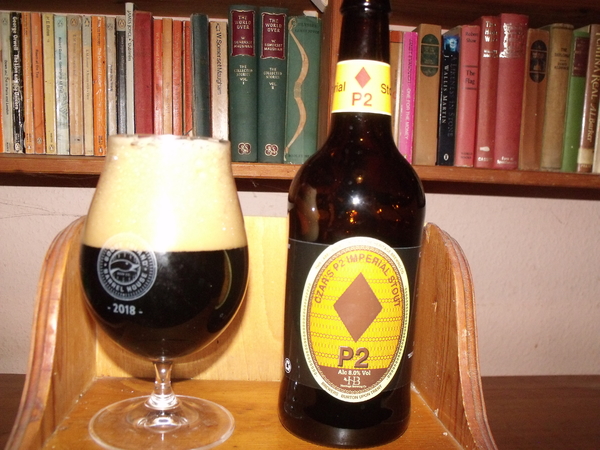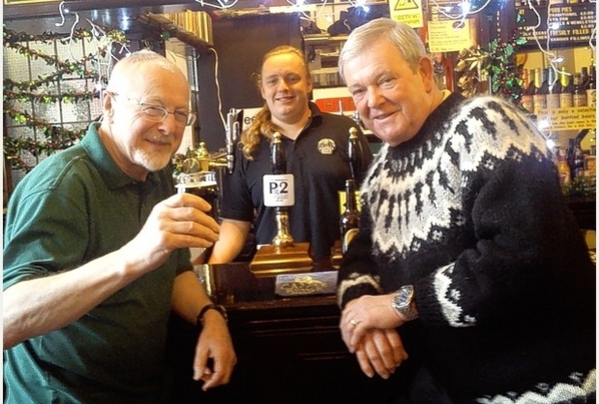Burton brewer revives Czar's stout
Added: Friday, February 1st 2019

A rare stout from the 19th century has been brought back to life thanks to the initiative of beer lovers in Derby and a master brewer in Burton-on-Trent.
Bass P2 Stout, now called the Czar’s P2 Imperial Stout, has been produced at the Heritage Brewery in the National Brewery Centre in Burton. Bass discontinued the stout in the 1960s but a small batch was brewed in 2014 by Steve Wellington, who had run the Heritage plant and its forerunner, the White Shield Brewery, in 2014.
The trial brew was made at the Haywood Bad Ram brewery in Ashbourne. In Derby, John Arguile, Dave Evans and Les Baynton – who had formed the Beer Lovers group to revive old styles --lobbied publicans to sell a draught version of the beer. It went on sale in a few selected outlets, including the Alexandra: John Arguile (left) and Steve Wellington are seen with landlord Ralf Edge in “the Alex”.
The interest created by the beer led to it being brewed at the Heritage plant in Burton. Bottles were stored for several weeks until brewers Martin Hodson and Caroline Horrabin were satisfied the beer, which contains live yeast, was ready for release. Martin and Caroline took over the Heritage Brewery when Steve Wellington retired, though he still acts as a consultant.
Imperial stouts were brewed in London in the 18th and 19th centuries by Barclay Perkins and other major brewers. London’s water at the time was best suited to making dark beers while Burton water, rich in sulphates, was renowned as the citadel of pale ale.
But the Burton brewers also made dark beers. Bass had a range of stouts, all with the brand letter of P. P stood for porter: in the 18th century, strong versions of porter were called stout porter, later reduced to just stout. P2 was first brewed in 1866.
Imperial stouts were strong in alcohol as they had to withstand a hazardous sea voyage from England to Russia. They were so popular at the Czar’s court in St Petersburg that brewers were awarded a royal warrant, which enabled them to use the term “imperial” in their branding. The trade with Russia came to an abrupt halt in 1917 following the Bolshevik revolution.
The label of the revised P2 bears the Bass brown diamond trademark. The brewer was the first to register its trademarks when legislation was introduced in the 19th century. The world-famous Bass red triangle, which adorned pale ale bottles, was the first British trademark.
P2 Stout is brewed with pale, crystal and black malts and hopped with Fuggles and Goldings. It’s a deep black colour with a barley white collar of foam. There’s burnt and roasted malts on the nose with powerful hints of cobnuts, cocoa and molasses, backed by peppery hops.
Creamy malt dominates the palate but is balanced by bitter hops, chocolate and molasses. The finish is bittersweet to start but roasted grains and peppery hops build in the finale.
As a result of the heavy costs of posting the 500ml bottles, the beer is on sale only at the National Brewery Centre in Horninglow Street in Burton and at Brews of the World, 159 Station Street, just two minutes from Burton station. A nine-gallon firkin of the draught version will be available at the Derby Winter Beer Festival in the Roundhouse, 20-23 February, but will sell out very quickly.
Hurry for a taste of history.
*Draught P2 will be on sale in the Alexandra Hotel, 203 Siddals Road, Derby from 6 February.









